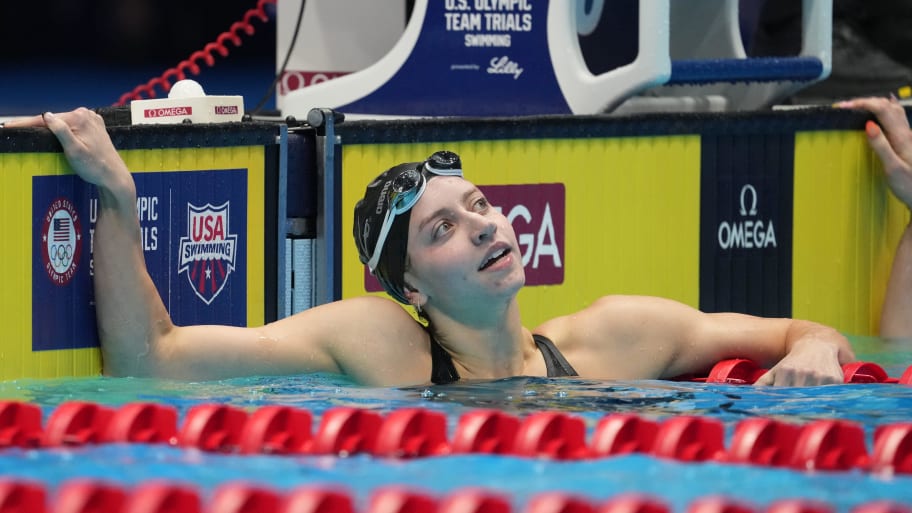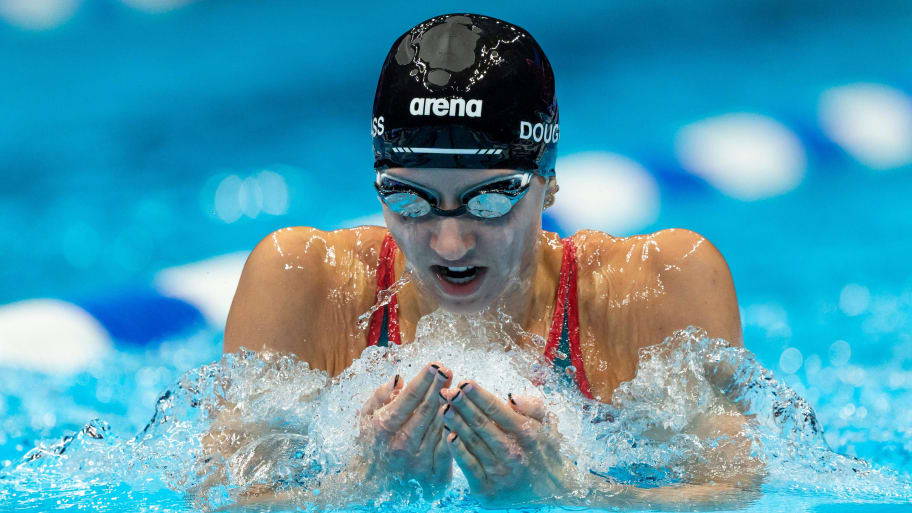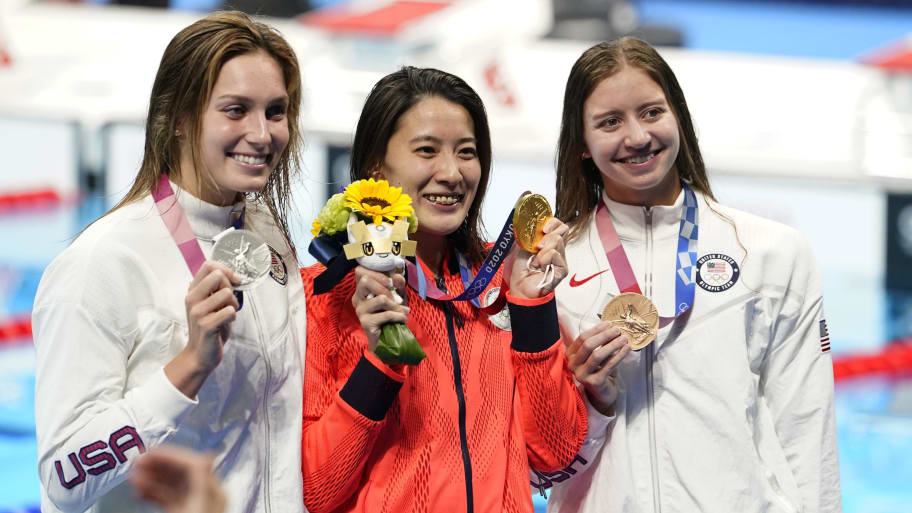
Kate Douglass can do just about anything in a pool. She can sprint with the fastest women in the world, and she can also stretch out across 200 painstaking meters of breaststroke as well as anyone. Fast twitch or graceful glide, whitewater fury or sustained stamina, she might be the most protean swimmer on the planet.
Shakespeare coined the phrase, “Jack of all trades is a master of none.” Douglass is threatening to rewrite it as a jack of all trades and a master of all. She’s the closest thing we have to an aquatic Shohei Ohtani.
But there is one thing Douglass cannot do—or, more accurately, will not allow herself to do: make a show of celebrating a big victory. Bat flippers and end-zone dancers cannot relate, but if Douglass wins gold medals for the United States in Paris, don’t expect theatrics. There is virtually no chance she slaps the water or climbs on a lane line.
“Personally, I don’t like it when people do that,” she says. “I find that a little obnoxious. That’s just me.”
Douglass at her most demonstrative will produce a post-race smile or a wave. Maybe a smile and a wave after doing something ridiculous, which happens with greater frequency these days. Something like setting one of her five current American records, or winning one of her 15 NCAA titles, or earning an Olympic bronze medal in 2021. What the 22-year-old Virginia graduate lacks in ostentation and self-promotion, she makes up for in understated substance.
Kate The Great is a natural, in and out of the water.
Douglass is gifted enough to have earned an Olympic Trials qualifying time at age 13 in the 200-meter breaststroke, fall out of love with the event before college, then pick it back up a couple of years ago—and become the fastest in American history. Hello, obnoxious.
She is quick enough to record the top time in the country (No. 2 in the world) in the 50 freestyle this year, but well-rounded enough to not even swim it at U.S. trials because it overlapped with the 200 individual medley. Imagine being good enough to be that choosey.
She had sufficient feel for the water and athleticism to become an Olympian and national champion without fully exerting herself in the weight room. Now she’s leaned into that work and leaned out her physique, adding noticeable muscle and dropping appreciable time in 2023 and ’24. Her kicking power, previously excellent, is now outrageous.
Douglass is the first American to make the Olympics in both the 100 freestyle and the 200 breast. (She has subsequently dropped the individual 100 free from her program to concentrate on the 200 breast and 200 IM, plus as many as three relays.) Those are disparate skill sets with nothing in common.
“She’s just so fluid and versatile,” Virginia coach Todd DeSorbo said. “She’s fun to work with.”
DeSorbo was vital in convincing Douglass that she could find ways to stay well-rounded in college. He constructed a weekly workout plan that has her floating between different strokes and distances.
“That was something I was skeptical about going into college, but Todd was very confident he could train me for a lot of different things,” Douglass says. “I feel like it’s been nice to be able to switch it up a lot. I do a different practice almost every day. I think that helps keep it fresh.”

In a sport where careers often are marked by explosive improvements, frustrating plateaus, existential crises and looming burnout, Douglass’s ascension has been remarkably orderly and consistent. She’s always been good, and she’s continued to get better—to the point of becoming the literal face of U.S. Olympic Trials last month (more on that later), then winning three events there to finalize her status as one of the key players in Paris.
“It’s just been gradual,” William Douglass, Kate’s father, says. “There was never a rocket ship. You get lucky sometimes and you find the right lane for your child. With Kate, we just got lucky.”
From the New Rochelle YMCA at age 7 to here, it has all seemed unforced and unhurried. That’s not to say it was easy. But the progress has been fairly organic.
The family’s existence never orbited around a gifted child’s swimming career: the Douglasses did not move from Pelham, N.Y., in search of a better club for Kate (the other two children are athletes but non-swimmers); there was no home-schooling to facilitate more pool time; Kate played multiple sports growing up, with swimming becoming the focus almost by default.
Dry-land sports meant sweating and running, two things she hated. So the pool made sense. “And I was pretty good at it,” she says.
Her parents both went to college in the state of Virginia, so Kate did as well. She enrolled at UVA at age 17 as a game-changing recruit who helped transform the program into a powerhouse that has won four straight NCAA championships. She graduated last year and stayed in Charlottesville, training there now as a professional while working on a master’s degree in statistics and doing a remote data analytics internship with Dell. Earlier this year she earned a co-byline on an article in The Mathematical Intelligencer magazine about using data to improve swimming speed.
Swimming often rewards the most precocious talents, bestowing upon them superstardom in their teens, but it can also punish them later. It’s not easy to peak at something before you’re old enough to vote—and old enough to process what’s happening to your life. Douglass is reaching her apex at an age where she can maturely absorb the onrush of fame, and the associated pressure.
Her elevated profile was clear in Indianapolis. For its featured advertising in its debut in an NFL stadium, USA Swimming could have gone with Katie Ledecky or Caeleb Dressel, each of whom has won seven Olympic gold medals. It could have gone with home-state hero Lilly King or Simone Manuel or Ryan Murphy, household names and multiple gold medalists who were in both the 2016 and ’21 Olympics. Instead, the national governing body of the sport opted for Douglass, plastering the winner of a single Olympic bronze medal on the side of Lucas Oil Stadium.
“Oh my gosh, this is terrible,” Allison Douglass, Kate’s mom, thought at the time. “Too much hype is never a good thing.”
The poster child herself was largely unfazed. If USA Swimming thought she was worthy of dwarfing a statue of Peyton Manning outside an NFL stadium, she would do her best to live up to the billing.
“Kate was surprisingly cool with it,” Allison Douglass says. “She was like, ‘Sure, why not?’ She seemed to just sail through.”
Douglass did sail through in the 200 breast and 200 IM. Favored in both, she won the former by 2.47 seconds (over King) and the latter by more than a second (over Virginia teammate Alex Walsh). She also claimed the 100 free title by a healthy .47 in a loaded field. Those margins are a useful measuring stick for her progress since 2021.
Back then, at age 19, Douglass was a prime Olympic contender but no sure thing. (“I really did not think she was going to make it,” Allison says.) The margin by which she did make it tells you everything about U.S. Olympic Trials and the difficulty of simply making the team.
After qualifying first in both the preliminaries and semifinals for the 200 IM, Douglass had to throw down a blazing final 50 meters of freestyle to edge out Madisyn Cox for second place by .02, which also was .02 behind winner Walsh. Douglass went into the freestyle leg nearly a full second behind before pulling that out. Who knows whether the last three years play out differently if she'd missed the Olympics by .02 instead of making it?
Exiting the arena in Omaha in ’21, his daughter’s ticket to Tokyo punched, William Douglass had a bit of a catharsis. “I had this realization that a load of bricks had come off my chest,” he says. "And I didn’t even know it was there.”
But one dream accomplishment is only a gateway to the next. Once a part of Team USA, the next goal was to swim in an Olympic final. And once that was secured—with the top time in the semifinals—it was natural to want a medal.

On the other side of the world, kept home by the pandemic, the Douglasses were a wreck watching the 200 IM final from afar. Pride, excitement and a withering combination of nervousness and powerlessness had suffused the household.
“I couldn’t breathe for the two days leading up to her event,” Allison says. “Just knowing your kid is over there by herself, with all that pressure.”
Adds William: “It’s the most excruciating but awesome thing. It was the worst feeling I never want to go through again, but at the same time it’s the coolest thing ever.”
On the night of the race, Kate’s siblings, Abby and Will, were more calm. Allison was standing. William was sitting on the couch. A single family friend was invited over on one condition: no talking during the two-minutes-and-change race.
What was the race like? William doesn’t know.
“I remember being on the couch and I remember it being on,” he says. “That’s about it.”
Allison cites the Taylor Swift Effect, a sort of euphoria-induced amnesia that has blotted out the concert experience for some who have seen Swift in person. Even watching the replay, Allison finds herself hyperventilating.
The race unfolded much like Trials in Omaha. Japan’s Yui Ohashi was dueling with Walsh for the lead heading into the final 50. Great Britain’s Abbie Wood was in third. Douglass was in fourth, desperate to make up time.
Ohashi got the wall first, just .13 ahead of Walsh. Douglass out-split Wood by .43 on the freestyle to grab the bronze by .11. Within 10 minutes, the Douglass’s house was full of friends. The celebration lasted until 2 a.m.
When Kate came home from Tokyo, the family put on a replay of her Olympic race. She couldn’t watch it—too much stress revisited.
This time around, three years later, the family will be in Paris to support her in person. That’s the good part. The hard part is that Kate Douglass isn’t a fresh face sneaking up on anyone this time around. After winning gold medals at the last two world championships, everyone sees her coming.
“My kid now is at a point where the expectations are high,” William says.
The expectations are high, but so is the ability. At age 22, each step in Kate Douglass’s gradual, consistent, organic trip to the top of swimming has prepared her for this pressurized Paris moment.
And if she wins a gold medal, she’ll do what comes naturally and understatedly. Probably a smile and a wave.
This article was originally published on www.si.com as Kate Douglass Is Set to Be Team USA’s Swiss Army Knife in Paris.







